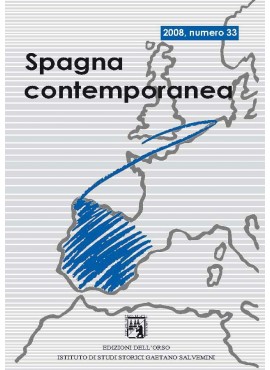La Chiesa tra pacificazione franchista e riconciliazione
Keywords:
Church, Francoism, Transition, Reconciliation, Historical Memory, Current HistoryAbstract
La Chiesa tra pacificazione franchista e riconciliazione
While most of the early analyses of the political transition from dictatorship to democracy in Spain in the Seventies were laudatory, a revision is being carried out by the various social sciences, obviously including historiography. As a result, a number of explanations not as positive on this political process that took place in Spain have been provided. The Catholic Church is no exception. Although in general it is still hardly interesting for researchers due to the overwhelming role it played in the history of Spain, there is an increasing number of studies being conducted on its role in the decade decisive for political change. All this after the positions had hardened into extreme visions ranging the Church as the pillar of dictatorship to an idealized image stressing the Church’s assumed fundamental contribution to political opening. After the II Vatican Council, a significant sector of the institution, called upon to lead its own transition process, tried to depart from Tridentine positions, to focus on independence from the State, to support democracy and to adopt new strategies. Therefore, the Church itself underwent transition between 1960 and 1975 in two stages, one bottom-up and the other top-down. But this change of attitude was not exclusive to the Church. Since the Fifties in several sectors of society a slow rapprochement took place and this has been referred to as the generation of reconciliation. At any rate, it is clear that these positions did not originate from within the Church and that, rather, it took too much for the Church to adopt this attitude, although over time it tended to appropriate it.
Downloads
Published
Issue
Section
License
Copyright (c) 2008 Istituto di studi storici Gaetano Salvemini, TorinoI

This work is licensed under a Creative Commons Attribution-NonCommercial-NoDerivatives 4.0 International License.



